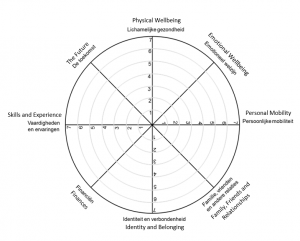 (This blog is written in English and French – please scroll to the end for the French language version.)
(This blog is written in English and French – please scroll to the end for the French language version.)
It’s been a cold and reluctant spring for us all in the HAIRE community: the UK saw the lowest April temperature since 1922. The sun is shining today, however, and we are feeling more hopeful as we get ready for summer and the opening up of our communities. By the end of April, HAIRE partners had compiled the initial Community Report drafts for our pilot areas, which combines information gleaned from Guided Conversations, Action Plans and Neighbourhood Analysis. Our partners are now preparing for our next major challenge: co-creating innovative service delivery in the pilot sites and beyond that respond to the challenges identified in their areas. Some challenges are unique to the pilot sites and some stem from issues that are commonplace in rural Europe.
For the past several weeks, the University of Exeter has been hosting drop-in Teams sessions for all partners to discuss progress and to share participatory methods for innovation and idea generation. We’ve looked at such techniques as mind-mapping and Q-sorting. We’ve discussed key practical considerations, such as tailoring sessions to different audiences and sizes and making sure all the exercises are inclusive. Our colleague Femke Verthé at iDROPS – a Belgian organisation skilled in social innovation development – led sessions on Human Centred Design Thinking, a participatory tool for inspiration, ideation, focusing and prototyping.
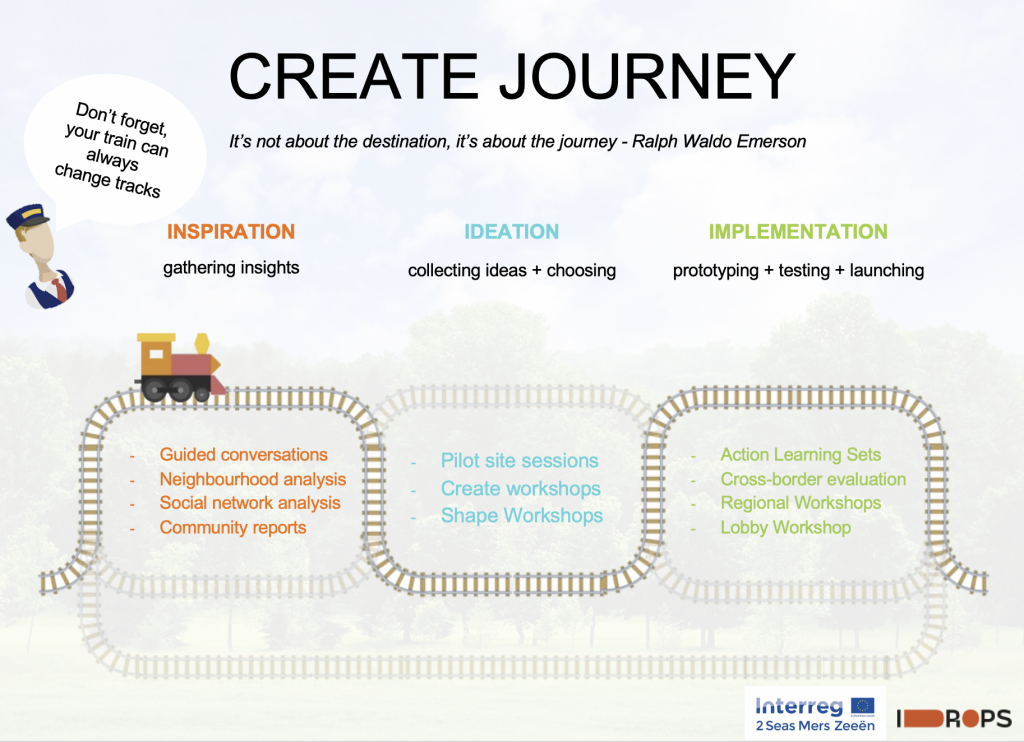
Throughout May, partners have been gathering ideas and meeting with their volunteers, stakeholders and communities in unique ways. For example, in East Sussex, the HAIRE enablers have been going on walks with their community, and this act of getting volunteers to talk to the community members really engages them in the idea generation process and makes for powerful, insightful input.
Drawing on their experience of piloting actions locally, the partners, older people, local partners, volunteers and agencies will come together in June in a joint CREATE workshop (Crossborder European Activity Testing Exercise) to share their experiences and support and mentor each other. Partners will organise themselves into Action Learning Sets, cross-border groups that want to work on shared innovations together. Action Learning is one of the methods effective programmes use to help participants apply learning in a support group. This approach encourages partners to make meaning from direct experience and supports genuine cross-border idea exchange.
We are also taking the time during the June CREATE workshops to “get to know each other” more personally. All the Covid restrictions have meant we haven’t been able to travel or meet with our counterparts in different countries. The socialising will have to wait a little longer, but we’ve integrated a creative writing workshop into the sessions, in which we’ll look at poems about ageing in all our languages, listen to each other speak in our native tongues, and write and share our own personal and cultural experiences of ageing. The atmosphere of mutual support, shared experience and cultural learning will provide another layer of depth and understanding in our cross-border exchange as we drive towards positive change for our older people.
Here’s one of our chosen poems.
Long Life, by Elaine Feinstein
Late Summer. Sunshine. The eucalyptus tree.
It is a fortune beyond any deserving
to be still here, with no more than everyday worries,
placidly arranging lines of poetry.
I consider a stick of cinammon
bound in raffia, finches
in the grass, and a stubby bush
which this year mothered a lemon.
These days I speak less of death
than the mysteries of survival. I am
no longer lonely, not yet frail, and
after surgery, recognise each breath
as a miracle. My generation may not be
nimble but, forgive us,
we’d like to hold on, stubbornly
content – even while ageing.
French Translation follows:
Ce fut un printemps frileux pour la communauté HAIRE, le Royaume-Uni ayant connu ses températures les plus basses depuis 1922 pour un mois d’avril. Aujourd’hui cependant, le soleil brille, et l’optimisme est lui aussi au rendez-vous alors que nous nous préparons en vue de l’été et de la réouverture de nos communautés. D’ici la fin du mois d’avril, les partenaires du projet HAIRE auront compilé les versions préliminaires des premiers rapports communautaires de nos sites pilotes, qui cumulent les informations récoltées lors des Conversations Guidées, des Plans d’Actions et des Analyses de Voisinage. Nos partenaires se préparent désormais à affronter notre prochain grand défi : non seulement cocréer une prestation des services innovante au sein de chaque site pilote, mais aussi résoudre les problèmes qu’ils ont distingués dans leur région respective. Certains problèmes sont propres à leur site pilote tandis que d’autres découlent de problèmes répandus en Europe rurale.
Ces dernières semaines, l’Université d’Exeter a animé des séances de discussion ouvertes sur Microsoft Teams, afin que tous les partenaires puissent discuter de l’avancée du projet et partager des méthodes participatives d’innovation et de conception de nouvelles idées. Nous avons testé des techniques comme la carte heuristique ou le Q-sort. Nous avons débattu de sujets clefs d’ordre pratique, par exemple comment adapter les séances à des publics différents et des groupes de tailles différentes, et comment s’assurer que tous les exercices sont inclusifs. Notre collègue Femke Verthé, de la société belge iDROPS – spécialisée dans le développement de l’innovation sociale –, a animé des séances sur le Design Centré sur l’Humain, un outil participatif d’inspiration, d’idéation, de concentration et de prototypage.
Au cours du mois de mai, nos partenaires ont recueilli les idées des uns et des autres et ont rencontré bénévoles, intervenants et communautés par le biais de méthodes uniques. Par exemple, dans le Sussex de l’Est, les Aidants HAIRE font régulièrement des promenades avec les membres de leur communauté. Cette démarche d’échange entre les bénévoles et la communauté les implique réellement dans le processus de conception de nouvelles idées, apportant au projet une contribution percutante et instructive.
Mettant à profit leur expérience pour mener des actions à l’échelle locale, les partenaires, les personnes âgées, les partenaires locaux, les bénévoles et les organismes se réuniront en juin lors d’un atelier CREATE (« Crossborder European Activity Testing Exercise ») commun, afin de partager leurs expériences ainsi que se soutenir et se guider mutuellement. Les partenaires se répartiront dans des « Sets de formation-action », des groupes transnationaux désirant travailler ensemble sur des innovations communes. La formation-action est l’une des méthodes que les programmes efficaces utilisent pour aider les participants à appliquer les notions apprises dans un groupe de soutien. Cette approche encourage les partenaires à trouver du sens dans leurs expériences directes et promeut un véritable échange d’idées à travers les frontières.
Pendant les ateliers CREATE de juin, nous prenons également le temps « d’apprendre à se connaître » de façon plus personnelle. Toutes les restrictions relatives au COVID19 nous ont empêchés de voyager ou de rencontrer nos homologues d’autres pays. Le retour de la vie sociale devra attendre encore un peu, mais nous avons mis en place un atelier de création littéraire parmi les différentes sessions. Cet atelier nous donnera l’occasion de découvrir des poèmes sur le vieillissement dans toutes nos langues, d’écouter les uns et les autres parler dans leur langue maternelle, et d’écrire et de partager notre propre expérience personnelle et culturelle du vieillissement. Cette atmosphère de soutien mutuel, de partage d’expérience et d’apprentissage culturel apportera une nouvelle dimension de profondeur et de compréhension à notre échange transnational, alors que nous avançons vers un changement positif pour nos personnes âgées.
Voici l’un des poèmes que nous avons choisis:
Longue vie, par Elaine Feinstein
Fin d’été. Soleil. L’eucalyptus.
C’est une chance que nul ne mérite
d’être encore ici, avec des soucis de tous les jours et rien de plus,
à placidement accorder des vers de poésie.
J’examine un bâton de cannelle
enroulé de raphia, des pinsons
sur l’herbe, et le buisson râblé
qui cette année a donné naissance à un citron.
Ces temps-ci je parle moins de la mort
que des mystères de la survie. Je ne suis
plus seul, pas encore chétif, et
depuis l’opération, je réalise que chaque souffle
Est un miracle. Ma génération n’est peut-être pas
preste mais, pardonnez-nous,
nous voulons tenir bon, obstinément
satisfaits – même en vieillissant.
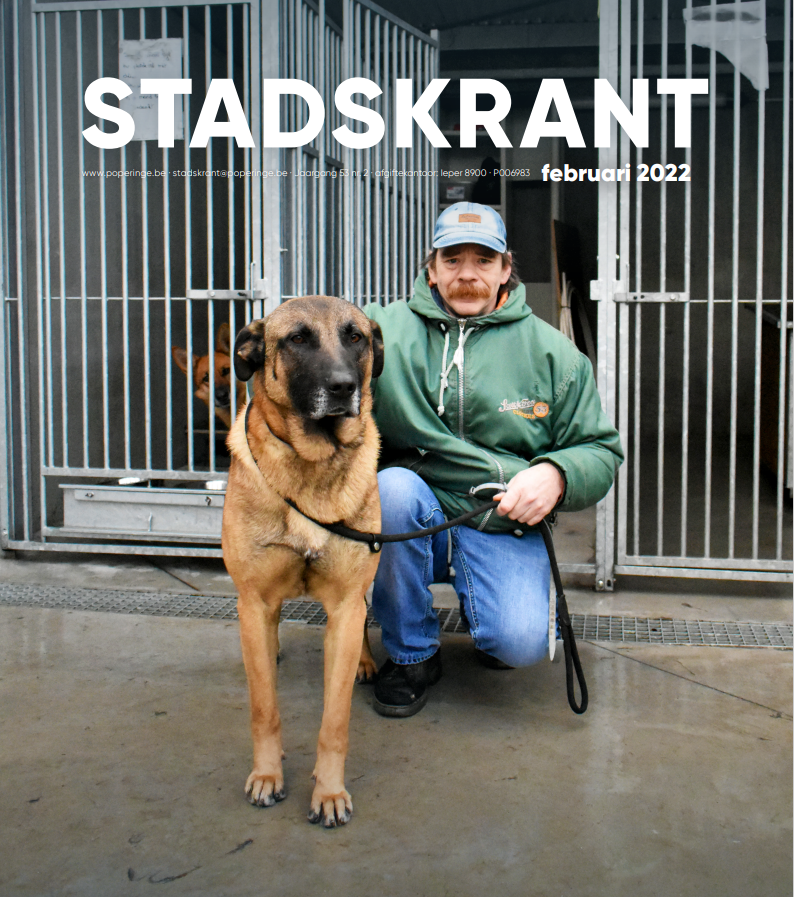
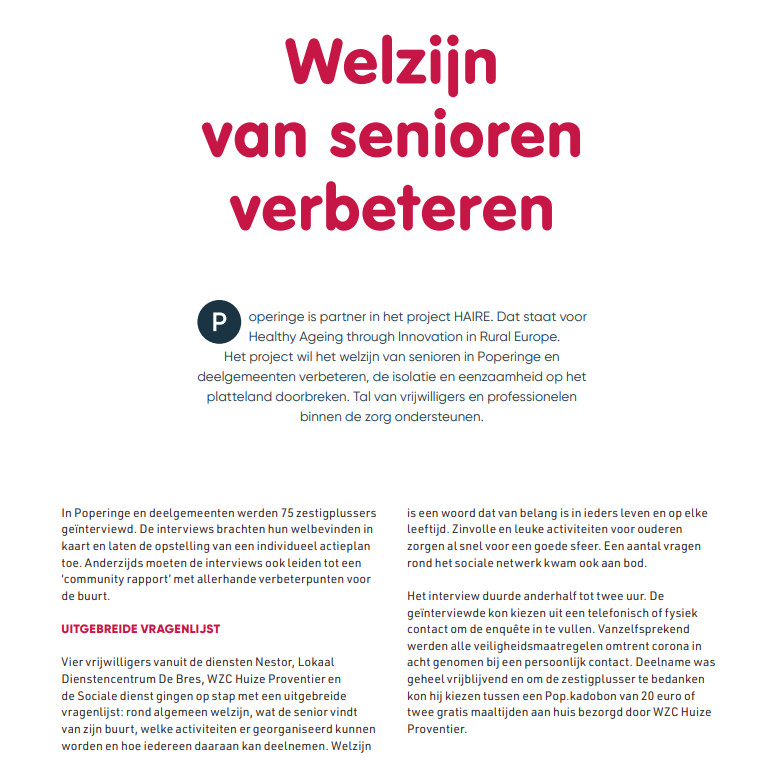
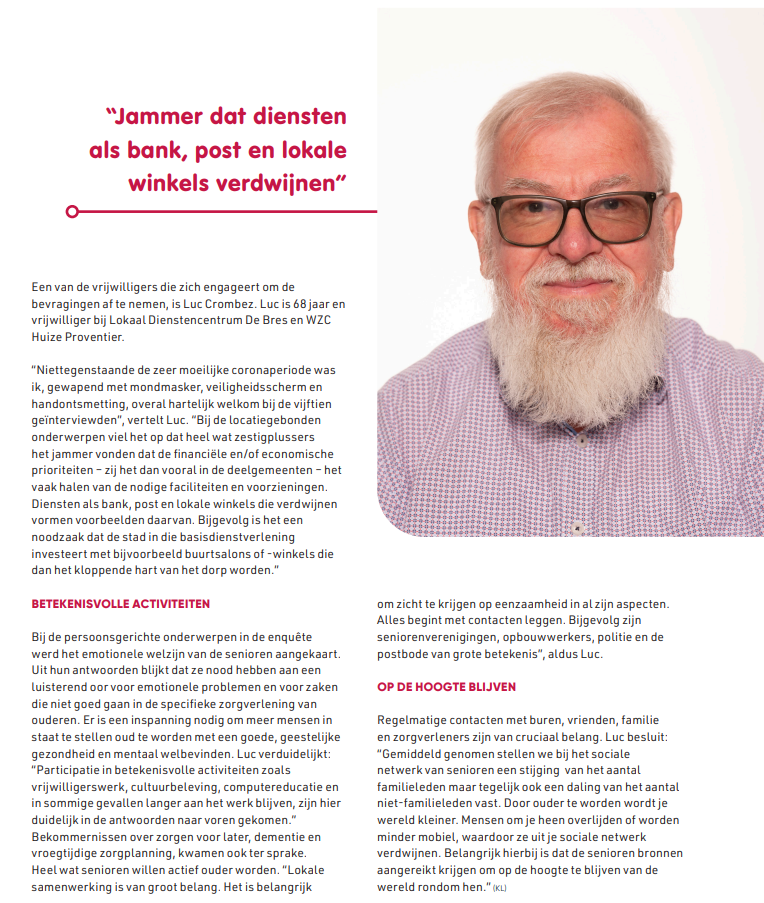
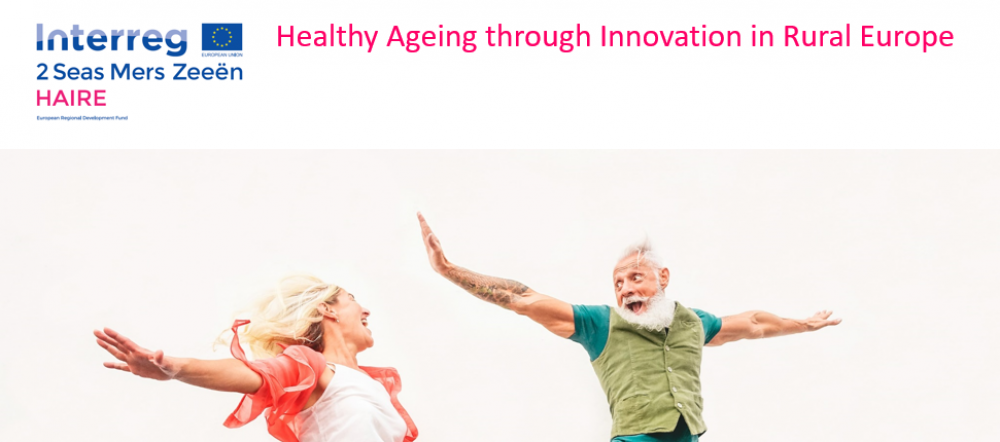
 Season’s Greetings! After nearly two years of working together throughout the Covid pandemic, the team has still not managed to meet up in person since the project launch in early 2020. At the end of 2021, plans for our first face to face gathering were once again thwarted by the emergence of Omicron, but we are still finding ways to connect with each other on a personal level despite everything. To celebrate the season, the HAIRE team got together virtually to share their favourite family recipes from each of our four countries: the UK, France, Belgium and the Netherlands. Such was the response we decided to make our own HAIRE recipe book, featuring tasty dips and snacks, desserts and treats from across the 2Seas region. Below are a few highlights …bon appetit!
Season’s Greetings! After nearly two years of working together throughout the Covid pandemic, the team has still not managed to meet up in person since the project launch in early 2020. At the end of 2021, plans for our first face to face gathering were once again thwarted by the emergence of Omicron, but we are still finding ways to connect with each other on a personal level despite everything. To celebrate the season, the HAIRE team got together virtually to share their favourite family recipes from each of our four countries: the UK, France, Belgium and the Netherlands. Such was the response we decided to make our own HAIRE recipe book, featuring tasty dips and snacks, desserts and treats from across the 2Seas region. Below are a few highlights …bon appetit!

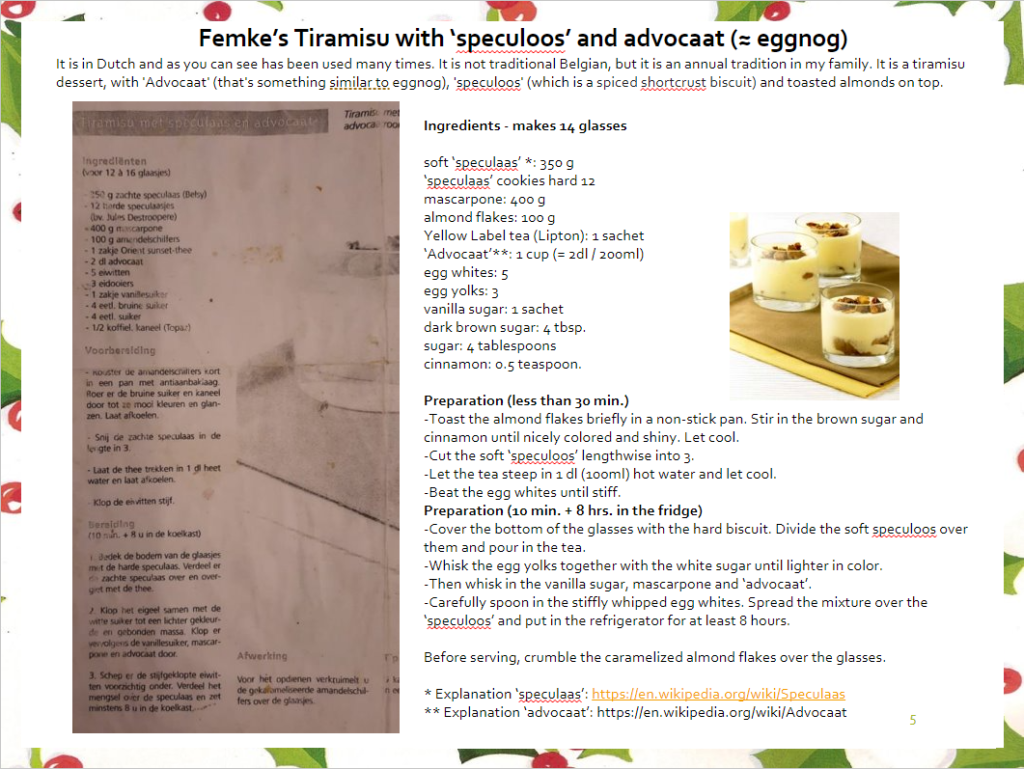
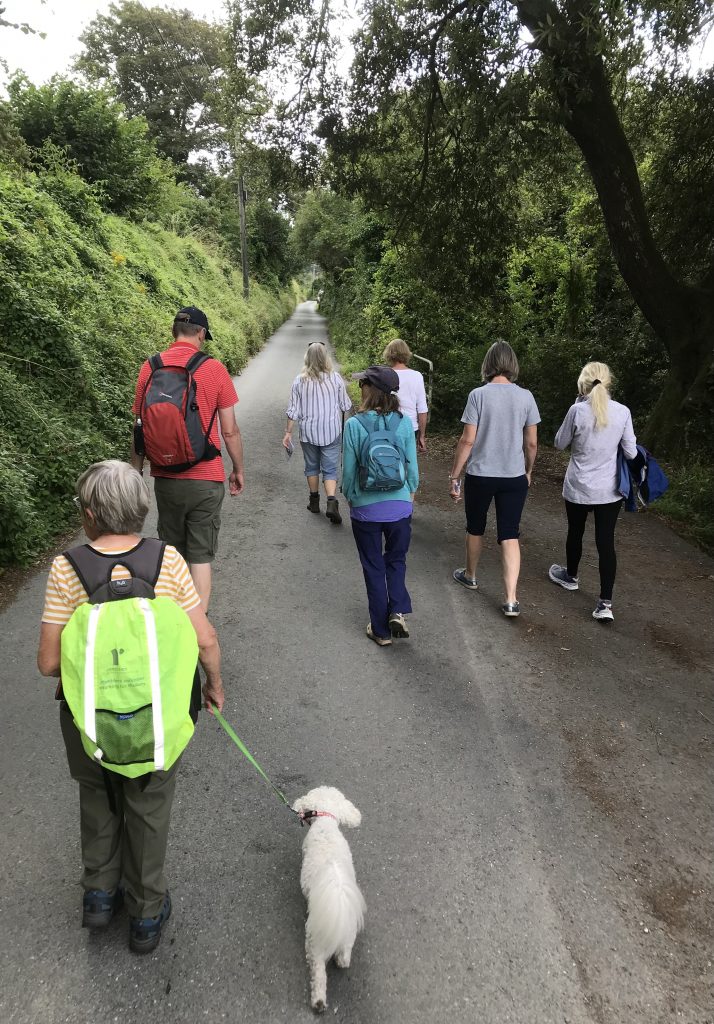
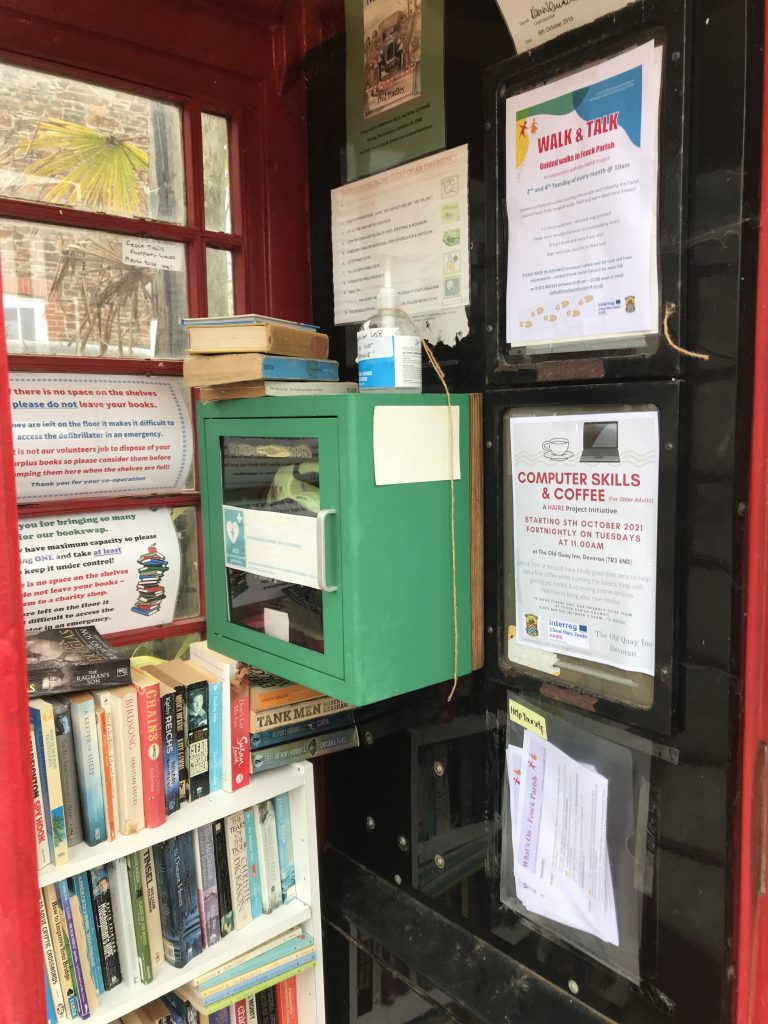
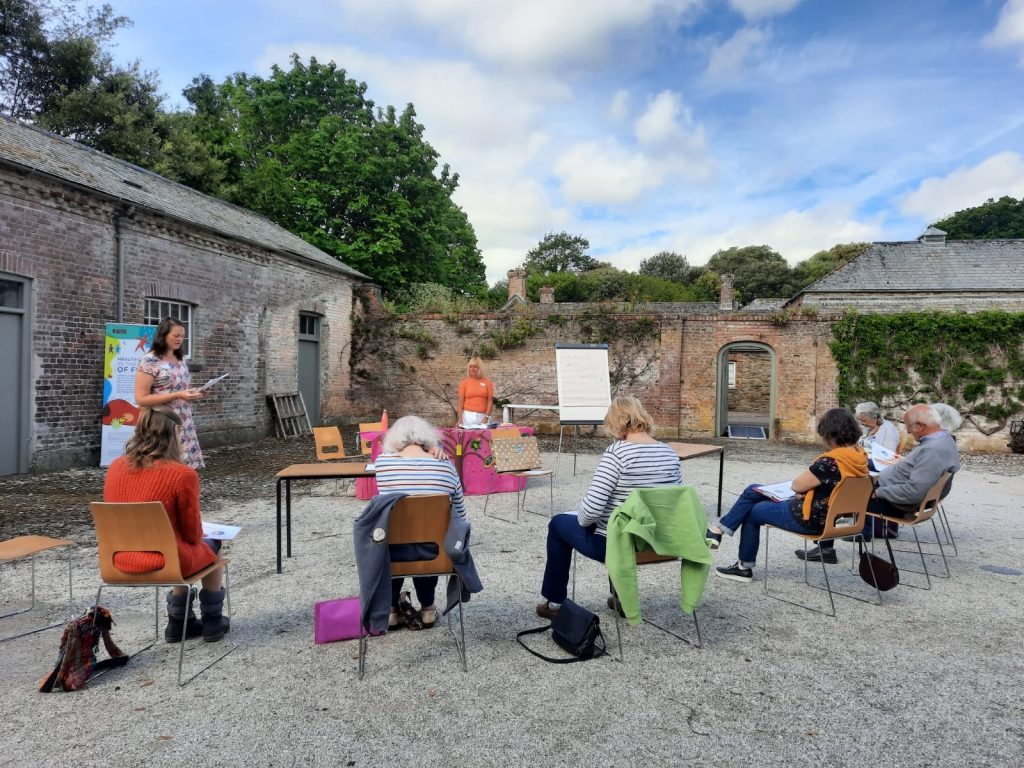
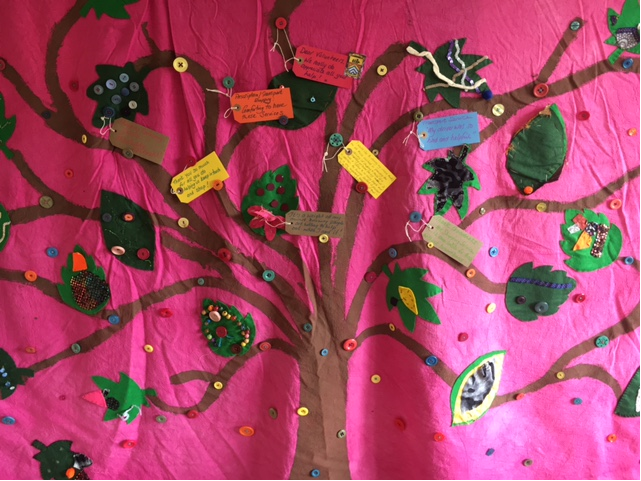
 Ha sido una primavera fría y recia para todos los miembros de la comunidad HAIRE: el Reino Unido registró la temperatura más baja en abril desde 1922. Sin embargo, hoy brilla el sol y nos sentimos más esperanzados mientras nos preparamos para el verano y la apertura de nuestras comunidades. A finales de abril, los colaboradores de HAIRE habían elaborado los primeros borradores de los informes comunitarios de nuestras zonas piloto, que combinan la información obtenida en las conversaciones guiadas, los planes de acción y el análisis de los barrios. Nuestros colaboradores se preparan ahora para nuestro próximo gran reto: crear conjuntamente una prestación de servicios innovadora en los lugares piloto y fuera de ellos que responda a los retos identificados en sus zonas. Algunos retos son exclusivos de los centros piloto y otros se derivan de problemas comunes en la Europa rural.
Ha sido una primavera fría y recia para todos los miembros de la comunidad HAIRE: el Reino Unido registró la temperatura más baja en abril desde 1922. Sin embargo, hoy brilla el sol y nos sentimos más esperanzados mientras nos preparamos para el verano y la apertura de nuestras comunidades. A finales de abril, los colaboradores de HAIRE habían elaborado los primeros borradores de los informes comunitarios de nuestras zonas piloto, que combinan la información obtenida en las conversaciones guiadas, los planes de acción y el análisis de los barrios. Nuestros colaboradores se preparan ahora para nuestro próximo gran reto: crear conjuntamente una prestación de servicios innovadora en los lugares piloto y fuera de ellos que responda a los retos identificados en sus zonas. Algunos retos son exclusivos de los centros piloto y otros se derivan de problemas comunes en la Europa rural.
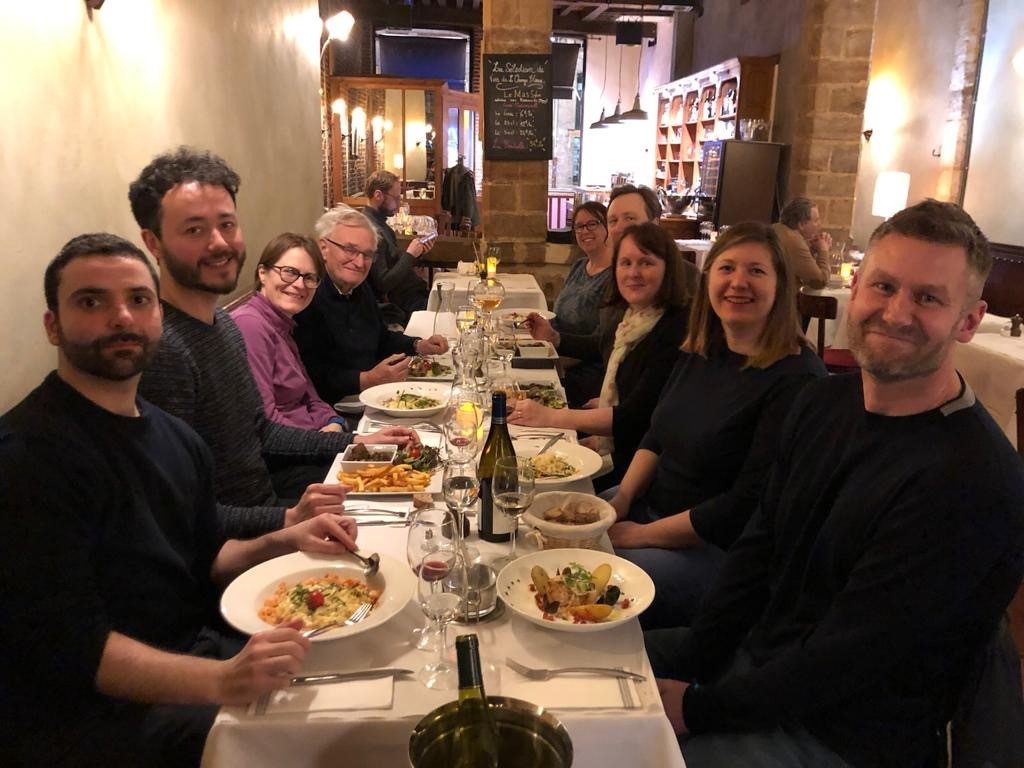
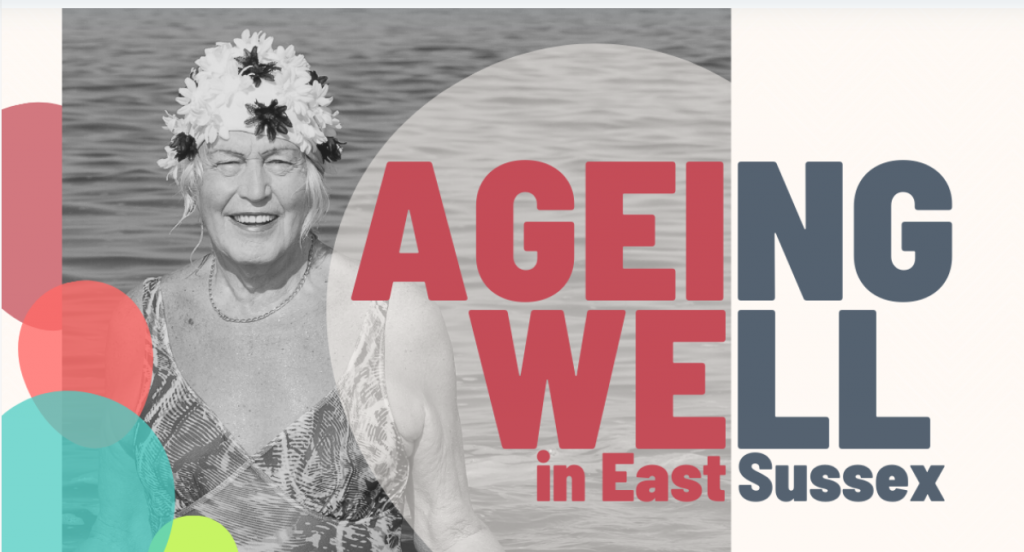
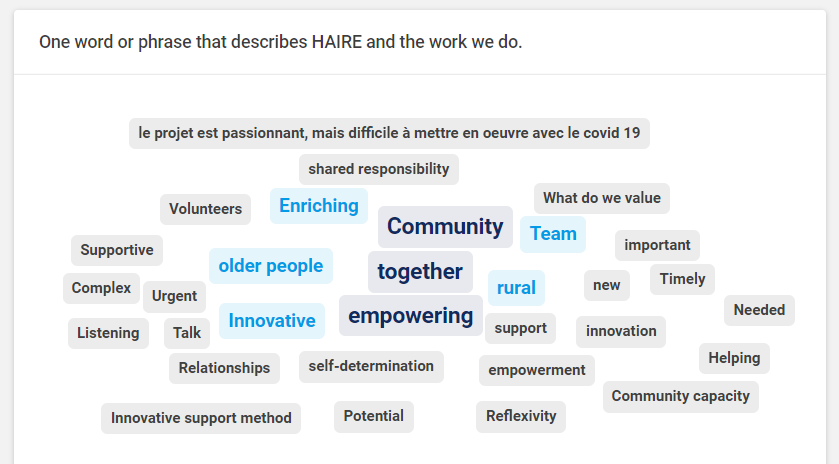 Lors de notre dernière réunion entre partenaires, nous avons demandé à chacun de décrire le travail réalisé par le projet HAIRE en un mot, par le biais de l’application web Slido. La bulle de mots a peu à peu pris forme et trois mots se sont démarqués : Autonomiser [en anglais « empowering »] Communauté Ensemble. A la lumière de cela, on ne s’étonnera pas de voir que nous avons dépassé notre objectif de recrutement d’Aidants en dépit des confinements et d’un contact présentiel limité avec les personnes âgées. Les Aidants sont les bénévoles et les professionnels de la santé qui ont été formés pour utiliser la boite à outils du projet HAIRE et diriger des entretiens avec les personnes âgées. Au départ, notre objectif de recrutement était de 80 Aidants ; nous en avons maintenant 147, dont 115 qui ont reçu leur formation. Bien que nous ayons été retardés, nous sommes en voie d’atteindre un total de 600 participants aux Conversations Guidées : nous avons recruté 282 participants parmi lesquels 126 ont déjà commencé leurs conversations.
Lors de notre dernière réunion entre partenaires, nous avons demandé à chacun de décrire le travail réalisé par le projet HAIRE en un mot, par le biais de l’application web Slido. La bulle de mots a peu à peu pris forme et trois mots se sont démarqués : Autonomiser [en anglais « empowering »] Communauté Ensemble. A la lumière de cela, on ne s’étonnera pas de voir que nous avons dépassé notre objectif de recrutement d’Aidants en dépit des confinements et d’un contact présentiel limité avec les personnes âgées. Les Aidants sont les bénévoles et les professionnels de la santé qui ont été formés pour utiliser la boite à outils du projet HAIRE et diriger des entretiens avec les personnes âgées. Au départ, notre objectif de recrutement était de 80 Aidants ; nous en avons maintenant 147, dont 115 qui ont reçu leur formation. Bien que nous ayons été retardés, nous sommes en voie d’atteindre un total de 600 participants aux Conversations Guidées : nous avons recruté 282 participants parmi lesquels 126 ont déjà commencé leurs conversations.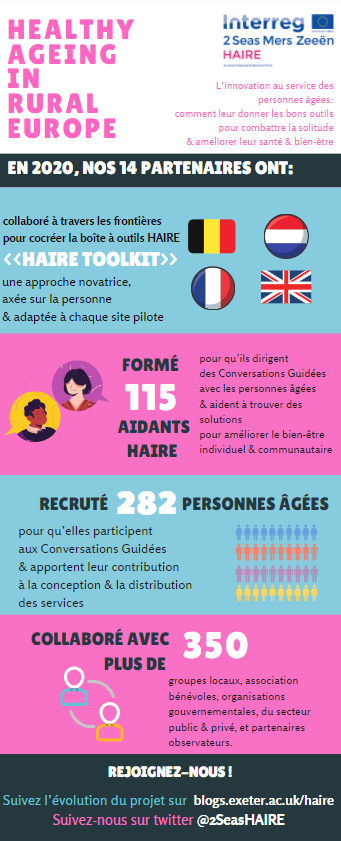 Dans sa conception, le projet HAIRE prend en compte ses futurs utilisateurs ainsi que le souci de la durabilité. Nos partenaires sont déjà en train de présenter le projet à de potentiels futurs utilisateurs de la boite à outils. Au Royaume-Uni, Devon Mind [association caritative axée sur la santé mentale] a présenté le projet HAIRE et son équipe à CoLab Exeter, un centre de cotravail intersectoriel et pluri-institutions sous le toit duquel environ 35 différents projets et services travaillent ensemble. Des échanges ont également eu lieu entre le conseil général du Sussex, Rother Voluntary Action et le conseil d’arrondissement de Hastings. D’un bout à l’autre de la région des 2Mers, nos partenaires sont en conversation avec les services sociaux des autorités locales ; en Belgique, des échanges ont eu lieu avec la Province d’Anvers et LiCalab (« Living and Care Lab »). En France, l’Université d’Artois a mis en place un partenariat – baptisé le « Cluster Senior » – entre plus de 30 organismes de la région; nos partenaires français se sont aussi associés au projet Interreg TICC, dirigé par Buurtzorg. Dans tous les pays, les sites pilotes maintiennent un contact régulier avec leur partenaire observateur. Au total, plus de 350 groupes locaux, groupes de bénévoles et une grande variété d’organismes ont contribué au partenariat HAIRE.
Dans sa conception, le projet HAIRE prend en compte ses futurs utilisateurs ainsi que le souci de la durabilité. Nos partenaires sont déjà en train de présenter le projet à de potentiels futurs utilisateurs de la boite à outils. Au Royaume-Uni, Devon Mind [association caritative axée sur la santé mentale] a présenté le projet HAIRE et son équipe à CoLab Exeter, un centre de cotravail intersectoriel et pluri-institutions sous le toit duquel environ 35 différents projets et services travaillent ensemble. Des échanges ont également eu lieu entre le conseil général du Sussex, Rother Voluntary Action et le conseil d’arrondissement de Hastings. D’un bout à l’autre de la région des 2Mers, nos partenaires sont en conversation avec les services sociaux des autorités locales ; en Belgique, des échanges ont eu lieu avec la Province d’Anvers et LiCalab (« Living and Care Lab »). En France, l’Université d’Artois a mis en place un partenariat – baptisé le « Cluster Senior » – entre plus de 30 organismes de la région; nos partenaires français se sont aussi associés au projet Interreg TICC, dirigé par Buurtzorg. Dans tous les pays, les sites pilotes maintiennent un contact régulier avec leur partenaire observateur. Au total, plus de 350 groupes locaux, groupes de bénévoles et une grande variété d’organismes ont contribué au partenariat HAIRE.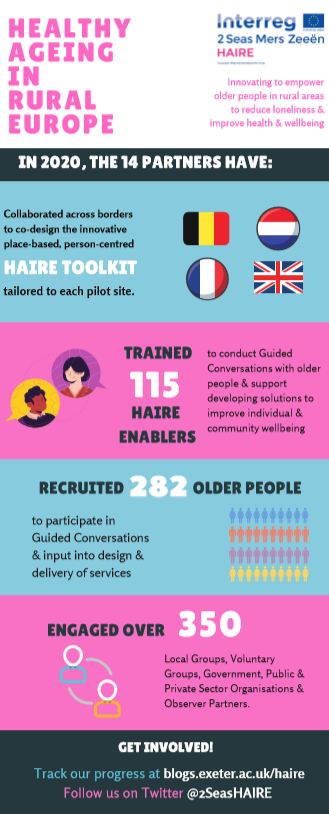 HAIRE is being designed with future users and sustainability in mind. Partners are already presenting the project to potential future users of the toolkit. In the UK, Devon Mind has introduced HAIRE and the team to
HAIRE is being designed with future users and sustainability in mind. Partners are already presenting the project to potential future users of the toolkit. In the UK, Devon Mind has introduced HAIRE and the team to 





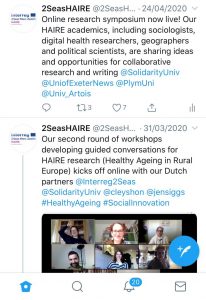 Thus, in the absence of being able to meet with people face to face, we adapted our partner engagement activities and co-design workshops to run virtually. We’ve done guided conversation workshops developing toolkits, discussing cultural context and sharing stories about how people use their spaces in different countries. We are working with our partners in the Netherlands, France and Belgium in new ways all the time – evidenced by our tweets!
Thus, in the absence of being able to meet with people face to face, we adapted our partner engagement activities and co-design workshops to run virtually. We’ve done guided conversation workshops developing toolkits, discussing cultural context and sharing stories about how people use their spaces in different countries. We are working with our partners in the Netherlands, France and Belgium in new ways all the time – evidenced by our tweets!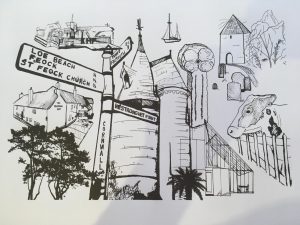 This is an example of the initial imagery inspired and created with our partners in the Cornish pilot site at Feock, which will form part of the guided conversation with older people in the local area. These images are from a specific part of the Feock pilot site. Images from other areas of the pilot site will be added to the design before a final version is produced.
This is an example of the initial imagery inspired and created with our partners in the Cornish pilot site at Feock, which will form part of the guided conversation with older people in the local area. These images are from a specific part of the Feock pilot site. Images from other areas of the pilot site will be added to the design before a final version is produced.